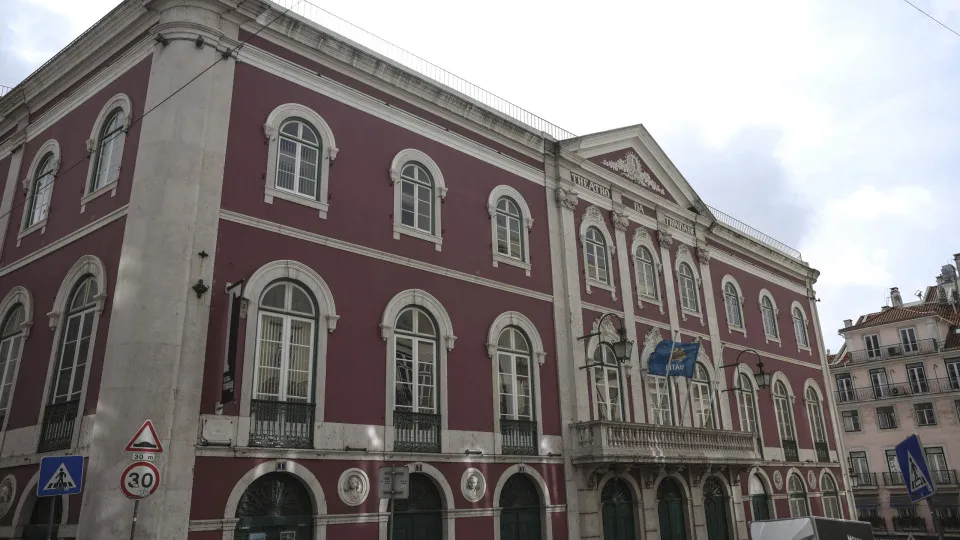
Inês Pires Tavares and Ivo Arroja star as Juliet and Romeo, respectively, in this “modern-times story,” inspired by Shakespeare’s classic ‘Romeo and Juliet,’ according to the presentation text from Teatro da Trindade/Inatel.
The two young people fall in love in a theater group: Juliet, “daughter of a xenophobic politician,” and Romeo, “son of migrants.”
As they rehearse Shakespeare’s play, the boundaries between fiction and reality weaken, with their lives “intertwining with the tragedy they portray,” according to the play’s synopsis.
In this “contemporary rewriting” of the author of ‘King Lear,’ “every scene is an attempt, a possible deviation from inevitable fate, testing the endurance of love against choices, chance, and each one’s past.”
“It’s irrelevant to know that Romeo and Juliet die in the end; what matters is how they die this time,” concludes the synopsis.
“Juliet & Romeo—a play for a pair of star-crossed lovers,” by Ricardo Correia, was the winning text of the 7th Miguel Rovisco New Theatrical Texts Award.
Born in Barcelos in 1977, Ricardo Correia holds a degree in Theater and a PhD in Artistic Studies from the University of Coimbra, with the project ‘Politics, Resistance, and Dramaturgical Practice in Contemporaneity—A Case Study.’ He teaches Theater and Education at the Polytechnic Institute of Coimbra and was a guest assistant in Artistic Studies at the University of Coimbra.
According to the actor and playwright’s agency page, Ricardo Correia worked with directors such as Bruno Gascon (‘Pátria’, 2023), Luísa Pinto and Carlos Coelho Costa (‘Filho Pródigo’, 2019), Patrícia Sequeira (‘Snu’, 2018), Henrique Oliveira (‘Cuba Livre’), João Cayatte (‘Vento Norte’). He also participated in productions like ‘Braga,’ ‘Amar de Mais,’ ‘Terra Brava,’ ‘A Prisioneira’ from different television channels.
He made his professional debut as an actor in 2001 at the Teatro Nacional de S. João in Porto, after being part of the Teatro Universitário do Minho. Since then, he has worked with several directors in “over 40 theater productions.”
In 2008, he founded Casa da Esquina—Associação Cultural in Coimbra for the development of transdisciplinary creation, investing in original dramaturgy, mediating between the real and fiction, using archives as practice, involving the documentary, autobiographical, post-memory, and questioning of territory in creations presented on national stages and in Germany, Brazil, Spain, and the United Kingdom.
‘Cartas de Guerra 61-74’, ‘Crise de 69—O Ano em que Sonhámos Perigosamente’, ‘O Museu da Consciência’, ‘Das Tripas Coração’ and ‘Eu Uso Termotebe e o Meu Pai Também’ are among some of his creations.
A Master in Theater, specializing in Staging by the Escola Superior de Teatro e Cinema, he was a Gulbenkian Foundation scholar at the London International School of Performing Arts in 2013. He is a researcher at CEIS20—the 20th Century Interdisciplinary Studies Center at the University of Coimbra.
Ricardo Correia is the author of “about a dozen theater texts,” with plays published by the Coimbra University Press, Teatro Nacional D. Maria II & Bicho do Mato (‘Call Center’), Livrinhos de Teatro dos Artistas Unidos (‘Eu Uso Termotebe e o Meu Pai Também’), and Edições Húmus (‘Cartas da Guerra 61-74 – Aerograma Liberdade’).
‘O Meu País É o Que o Mar não Quer e Outros Peças,’ a collection of his theater texts from 2014 to 2017, was published by the Coimbra University Press.
Internationally, his works are published by the Autonomous University of Nuevo León in Mexico and Les Presses Universitaires du Midi in France.
The Miguel Rovisco Award for New Theatrical Texts is presented annually by Teatro da Trindade to encourage the writing of original works in Portuguese, in the field of Theater. It includes a monetary prize of 3,000 euros, the publication of the text in book form, and the production of the play at the Trindade, with the performance recorded and broadcast by RTP, in a co-production between the two entities.
Under the award, the text is also published in the Teatro da Trindade Inatel’s editions collection. The launch takes place on October 11, following the premiere of the play.
Running until October 26, ‘Julieta e Romeu’ has performances from Wednesday to Sunday at 7:00 PM.
The set design is by Henrique Pimentel, lighting design by Pedro Gonçalves, and music and sound design by Afonso de Portugal.
After the session on October 12, there will be a conversation with the audience.




